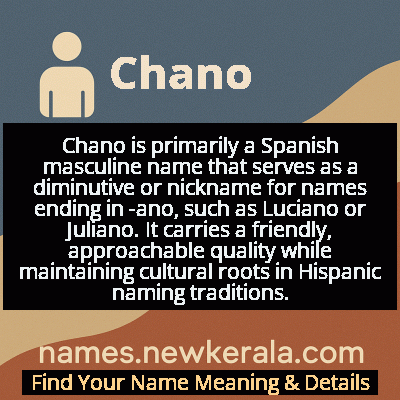Chano Name Meaning & Details
Origin, Popularity, Numerology Analysis & Name Meaning of Chano
Discover the origin, meaning, and cultural significance of the name CHANO. Delve into its historical roots and explore the lasting impact it has had on communities and traditions.
Name
Chano
Gender
Male
Origin
Spanish
Lucky Number
5
Meaning of the Name - Chano
Chano is primarily a Spanish masculine name that serves as a diminutive or nickname for names ending in -ano, such as Luciano or Juliano. It carries a friendly, approachable quality while maintaining cultural roots in Hispanic naming traditions.
Chano - Complete Numerology Analysis
Your Numerology Number
Based on Pythagorean Numerology System
Ruling Planet
Mercury
Positive Nature
Adventurous, dynamic, curious, and social.
Negative Traits
Restless, impatient, inconsistent, prone to indulgence.
Lucky Colours
Green, white.
Lucky Days
Wednesday.
Lucky Stones
Emerald.
Harmony Numbers
1, 3, 9.
Best Suited Professions
Sales, marketing, travel, entertainment.
What People Like About You
Versatility, charisma, adventurous spirit.
Famous People Named Chano
Chano Domínguez
Musician
Renowned Spanish jazz pianist and composer known for blending flamenco with jazz
Chano Pozo
Musician
Cuban percussionist and composer who revolutionized Latin jazz and collaborated with Dizzy Gillespie
Chano Lobato
Singer
Celebrated Spanish flamenco singer from Cádiz, known for his bulerías and festive style
Chano Urueta
Film Director
Mexican film director, screenwriter and actor who directed over 70 films including horror classics
Name Variations & International Equivalents
Click on blue names to explore their detailed meanings. Gray names with will be available soon.
Cultural & Historical Significance
The name's evolution from nickname to standalone given name illustrates broader cultural shifts in naming conventions, where informal appellations gain formal recognition. In flamenco culture, Chano represents authenticity and deep connection to traditional arts, while in contemporary contexts, it symbolizes the fusion of heritage with modern creativity. The name's persistence across generations speaks to its versatility and enduring appeal within Latino communities worldwide, serving as both a link to cultural roots and an expression of individual identity.
Extended Personality Analysis
Individuals named Chano are often perceived as charismatic, creative, and emotionally expressive. They tend to possess natural artistic talents, particularly in music and performance arts, with a flair for improvisation and spontaneous expression. This creative energy is balanced by strong social intelligence, making them excellent communicators who easily connect with diverse groups of people. Their personality typically combines traditional values with modern adaptability, allowing them to honor their cultural heritage while embracing contemporary ideas.
Chanos are often described as passionate and determined, approaching life with intensity and conviction, whether in artistic pursuits, personal relationships, or professional endeavors. They tend to be loyal friends and family members who value deep, meaningful connections over superficial interactions. There's often a rhythmic quality to their approach to life—they move with a natural flow that can adapt to changing circumstances while maintaining their core identity. This combination of creativity, loyalty, and adaptability makes them well-suited for leadership roles where innovation must be balanced with tradition, and where personal connection enhances professional effectiveness.
Modern Usage & Popularity
In contemporary usage, Chano maintains steady popularity in Spanish-speaking countries, particularly in Spain, Mexico, and Cuba. While it originated as a nickname, it has evolved into a standalone given name that parents choose for its distinctive yet familiar sound. The name enjoys moderate popularity in urban Latino communities in the United States, where it represents cultural heritage while fitting modern naming trends. Recent years have seen a slight resurgence as parents seek names that are traditional yet uncommon, with the added appeal of multicultural flexibility. It remains more popular in artistic and musical circles, likely influenced by famous bearers in these fields, and continues to be used both as a formal given name and as an affectionate nickname for longer names ending in -ano.
Symbolic & Spiritual Meanings
Symbolically, Chano represents the fusion of tradition and innovation, embodying the creative spirit that transforms established forms into new expressions. The name carries connotations of musicality and rhythm, symbolizing the ability to find harmony in complexity and beauty in improvisation. It suggests a bridge between cultures—connecting Spanish linguistic traditions with global influences, particularly through its Chinese surname connection. Chano symbolizes authenticity and emotional depth, representing individuals who remain true to their roots while embracing progress. The name also embodies the concept of 'familiar excellence,' suggesting that greatness can emerge from humble, everyday origins through dedication and passion, and carries the symbolic weight of cultural preservation through artistic expression and personal integrity.

